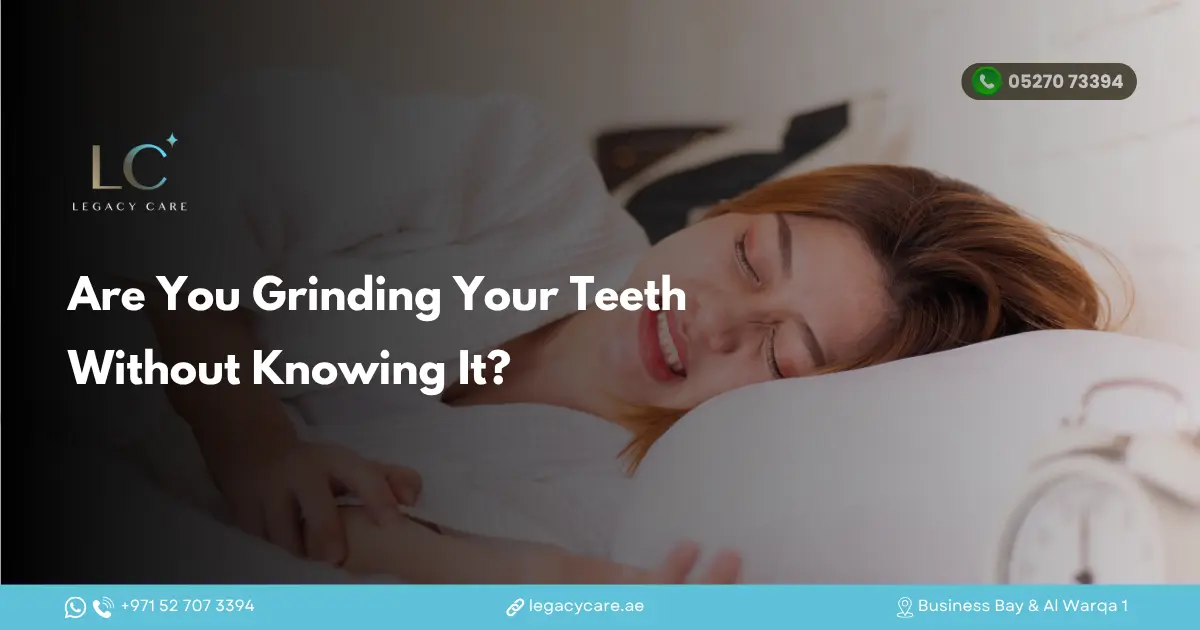You wake up in the morning with a sore jaw or a dull headache and think, “Maybe I slept wrong.”
But what if the real reason is that you’ve been grinding your teeth all night — without even realizing it?
At Legacy Care, we see this more often than you’d think. Many patients have no clue they’re doing it until the symptoms show up — worn teeth, jaw tension, or even cracked fillings.
It’s one of those habits your body hides from you… until it starts causing problems.
What Exactly Is Teeth Grinding?
Teeth grinding, or bruxism, is when you clench or grind your teeth — usually during sleep, though some people do it while awake too.
It’s not just a bad habit; it’s a stress response.
Your jaw muscles tighten, your teeth press together, and over time, that pressure wears down enamel, causes pain, and even affects your bite.
A quick test?
Try resting your tongue lightly between your upper and lower teeth right now.
If that feels strange or tense, you might be clenching more than you realize.
Common Signs You Might Be Grinding
Most people don’t hear or feel it happening, but the signs are there. Look out for these:
- Waking up with jaw soreness or stiffness
- Dull headaches in the morning
- Flattened, chipped, or sensitive teeth
- Ear pain or tightness near the temples
- Clicking or popping sounds when opening your mouth
Some patients even say their partner hears a grinding sound at night — that’s usually the first clue.
Why Do People Grind Their Teeth?
It’s not always clear why it happens, but stress is a big trigger.
When you’re anxious, angry, or even focused, your body finds small ways to release tension — and clenching is one of them.
Other possible causes include:
- Sleep disorders like snoring or sleep apnea
- Missing or misaligned teeth
- Caffeine or alcohol before bed
- Certain medications
And sometimes, it’s just how your body reacts to pressure — a physical habit tied to emotional stress.
What Happens If You Ignore It?
At first, it might seem harmless. But constant grinding wears down your enamel — the hard layer protecting your teeth.
Once enamel is gone, it doesn’t grow back. That’s when sensitivity, pain, and even fractures start.
Over time, your bite can shift, your gums may recede, and your jaw joints (TMJ) can get strained.
I’ve seen patients who come in thinking they need a filling, only to find the real cause was months of nighttime grinding.
How to Stop or Control Teeth Grinding
The first step is awareness. Once we confirm you’re grinding, we create a plan based on your cause.
At Legacy Care, we usually recommend:
- Custom Night Guards
These are clear protective trays you wear while sleeping. They cushion your teeth and relax your jaw muscles.
Unlike store-bought ones, ours are custom-made using digital scans, so they fit comfortably and last longer. - Stress Relief and Relaxation
Since stress is often the root cause, we suggest simple evening habits — deep breathing, reading, or gentle stretching before bed. - Jaw Exercises
Gentle exercises during the day can help retrain your muscles to stay relaxed. - Dental Adjustments
If misalignment is part of the problem, we may reshape high points on certain teeth or recommend orthodontic correction.
Sometimes, small changes — like cutting back on caffeine or getting better sleep — can make a big difference too.
Can the Damage Be Reversed?
If grinding has already worn down your teeth, don’t panic.
We can restore your smile with treatments like bonding, veneers, or crowns, depending on the severity.
Our focus at Legacy Care is always to save your natural teeth and rebuild what’s been lost in a way that looks and feels natural.
The key is catching it early. Once we identify the pattern, most patients notice improvement within weeks of wearing a night guard or following a care plan.
Final Thoughts from Your Dentist
Teeth grinding might seem like a small issue, but it’s one of those things that quietly damages your smile over time.
If you’ve been waking up tired, sore, or clenching during the day, don’t ignore it. A quick visit and a digital scan can reveal exactly what’s happening — and fixing it is usually easier than you think.
Remember, your mouth doesn’t rest while you sleep — but with the right care, it can heal while you do.
📍 Book a visit at Business Bay or Al Warqa 1
📞 Call +971 527073394
📅 Book Online: https://www.legacycare.ae/book-appointment/

